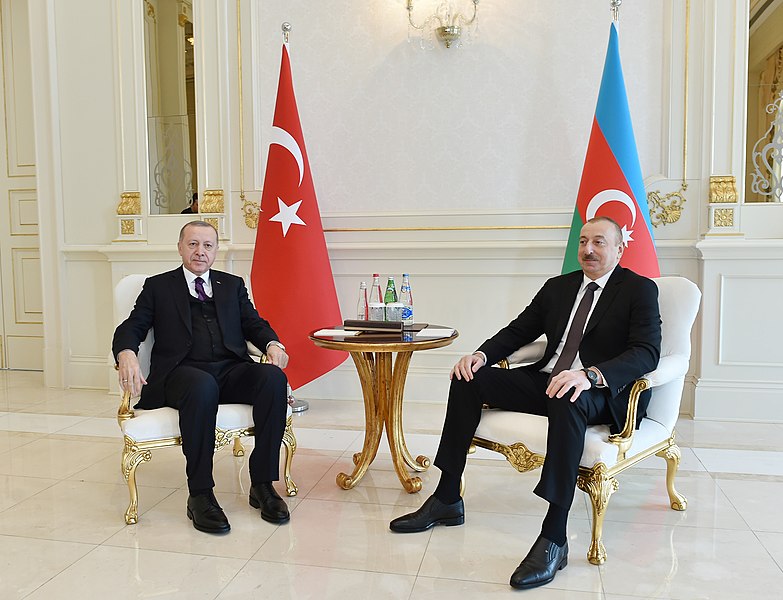Top photo: Turkish President Recep Tayyip Erdoğan visits Azerbaijan in February 2020. (Photo: Presidential Press and Information Office’s of Azerbaijan)
Welcome to Factal Forecast, a look at the week’s biggest stories and what they mean from the editors at Factal. We publish our forward-looking note each Thursday to help you get a jump-start on the week ahead. You can subscribe for free.
A look ahead:
Nov. 12/ Turkic Council leaders meet: The heads of state of Turkic Council members — Azerbaijan, Kazakhstan, Kyrgyzstan, Turkey and Uzbekistan — will meet in Istanbul on Friday for their eighth summit.
- What’s happened so far: Leaders are expected to discuss regional security issues, including the Afghanistan conflict and political mediation following the Nagorno-Karabakh conflict, which ended with a Russia-brokered agreement just over a year ago. During an extraordinary meeting, foreign ministers of the Turkic Council stressed teh importance of countering terrorism following the Taliban re-emergence in Afghanistan. In September, Turkey said it would coordinate steps to reestablish relations between Azerbaijan and Armenia, but no such meeting has been planned.
- The impact: While Uzbekistan denies claims that there are Afghan refugees in the country, rights groups say there are hundreds currently facing uncertainty unless a comprehensive migration plan is discussed in the summit. In terms of the Nagorno-Karabakh conflict, Turkey has historically been a staunch supporter of Azerbaijani independence in the form of political and military assistance, so Armenia is unlikely to welcome the prospect of it mediating post-conflict negotiations.
Nov. 12/ Paris conference on Libya: France is set to host an international conference on Libya on Friday ahead of elections in the North African state that is observing a fragile peace following a revolution and a years-long civil war.
- What’s happened so far: Ten years since the toppling of the Gaddafi regime in the country’s Arab Spring revolution, Libya has failed to see the long-term stability that neighboring states such as Tunisia and Egypt have. Following the 2011 revolution and a period of relative calm, efforts to build a democratic state disintegrated after a slide into factionalism. A six-year civil war erupted in 2014. A ceasefire, agreed to by parties in Geneva in October of last year has largely held but was recently tested by fighting between rival armed factions in Tripoli in September.
- The impact: Long-term peace is the international community’s goal, and with the weight of the White House being thrown behind the Paris conference through Vice President Kamala Harris’ attendance, there is hope that the upcoming elections will be fair and a key first step for lasting stability. The peace conference will also seek to address the recent tide of migrants that has flowed through the Mediterranean into Europe, leaving many dead.
Nov. 14/ Argentina general legislative election: Argentinians will vote Sunday to elect representatives in the higher and lower chambers of parliament as part of a partial restructuring of legislative powers dictated by the country’s constitution.
- What’s happened so far: This election follows a historical defeat of the ruling party in the Sept. 12 primaries. President Alberto Fernandez’s progressive Frente de Todos party obtained only 31 percent of the votes nationwide, while former President Mauricio Macri’s conservative Juntos por el Cambio party won 40 percent. The electoral debacle created an internal crisis in the executive chamber, leading to a cabinet reshuffle. Fernandez also introduced socio-economic reforms, including a raise of the minimum wage, a higher threshold for income tax and other measures aimed at stimulating consumption in a country that has been stuck in an economic recession since 2018.
- The impact: It is unclear if the measures taken by the government to avert the general discontent will be effective enough to maintain the majority in the chamber. Voting in Argentina is a constitutional obligation — more than 34.3 million citizens will elect 127 candidates to the Chamber of Deputies and 24 to the Senate. The winners will officially take their seats in December.
Nov. 14/ Bulgaria elections: Bulgarian citizens will vote again Sunday after two inconclusive general elections in April and July.
- What’s happened so far: The earlier two elections nearly ended the power hold of Bulgaria’s center-right GERB party after almost a decade, but political disputes between its opponents prevented them from forming a government. Though GERB leads the polls in the upcoming election, none of the six parties expected to win seats are likely to secure a majority, leading to difficult coalition talks after the election. In the presidential elections, polls show incumbent President Rumen Radev is expected to remain in power, with the closest challenger being Anastas Gerdjikov, who is backed by the GERB party.
- The impact: The coronavirus pandemic recovery is one of the biggest issues going into this election, with growing concerns about the rising cost-of-living and general quality of life. GERB has faced criticism over corruption, something other parties have focused on in previous elections. But the party has been able to capitalize on concerns about the pandemic response and high energy costs to maintain support going into this election.
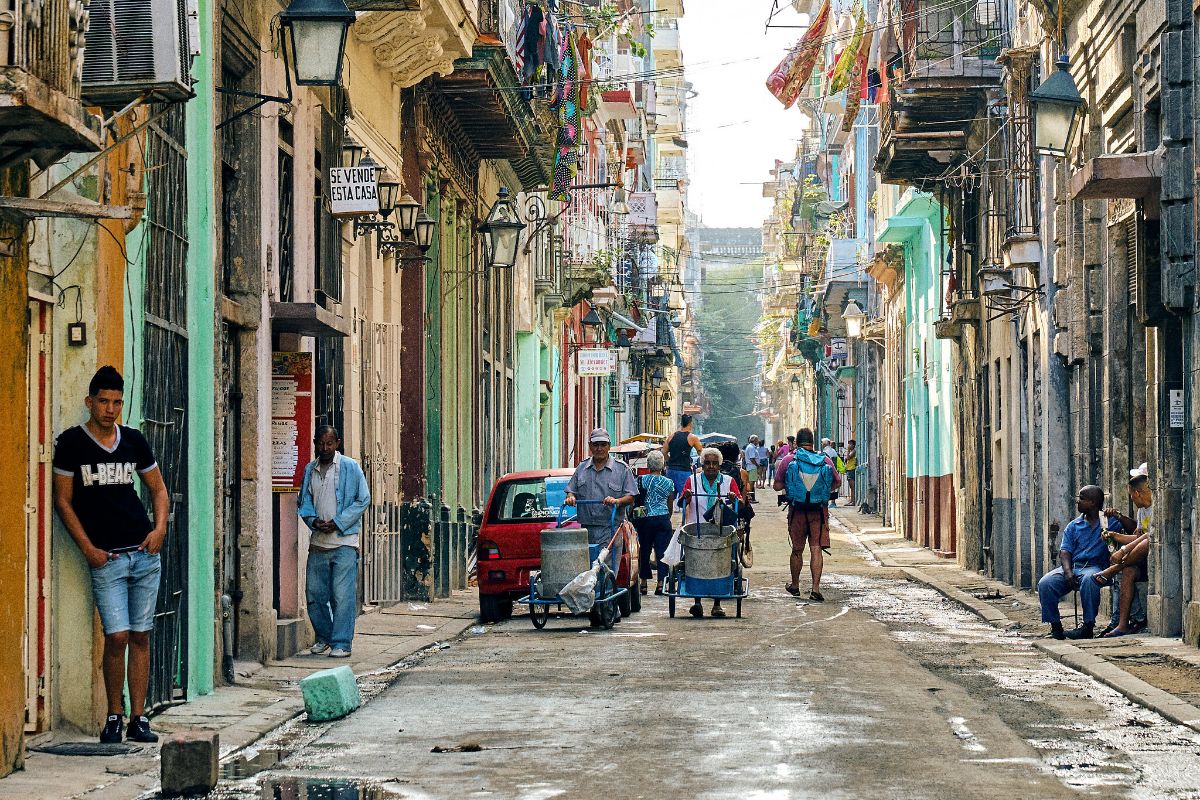
Nov. 15/ Cuba reopens borders to tourists: Travelers will need only proof of coronavirus vaccination or a negative PCR test to enter Cuba starting Monday, as the country drops a mandatory quarantine requirement in an effort to jumpstart an ailing tourism sector.
- What’s happened so far: Cuba gradually lifted restrictions in recent weeks on the heels of a strong vaccination campaign. More than 90 percent of the Cuban population has received at least one dose of one of the three homegrown vaccines offered in the island nation — Soberana 02, Abdala and Soberana Plus — with cases, hospitalizations, and deaths all on the decline. The start of tourism season, however, comes at a time of increasing tensions between the government and opposition, with an unauthorized Civic March for Change also scheduled for Monday.
- The impact: More than 4 million tourists visited Cuba in 2019, generating about $3 billion, compared to just 200,000 thus far in 2021 with another 100,000 expected by year’s end, according to Tourism Minister Juan Carlos Garcia.
Nov. 15/ Hearing on Amazon union efforts: The U.S. National Labor Relations Board (NLRB) will hold a hearing Monday on a petition by Amazon workers to unionize a Staten Island, N.Y., warehouse.
- What’s happened so far: Amazon has long resisted unionization at its warehouses. This spring, workers in a Bessemer, Ala., warehouse voted overwhelmingly not to form a union in the first such vote since 2014. Amazon aggressively campaigned against the unionization, including blanketing the warehouse with flyers, texting employees and holding mandatory meetings presenting opposition to unionization. In August, an NLRB officer said the company’s conduct prior to the vote interfered with the election. A decision on whether to order a new election in Alabama is forthcoming.
- The impact: The NLRB will determine if there is sufficient interest to hold a union vote in New York. Organizers from Amazon’s Staten Island facilities say they’ve collected approximately 2,000 signatures from warehouse workers who say they want a union election. The campaign is not affiliated with any national union. The workers are pushing for higher wages, longer breaks and better medical and other leave options. If organizers in New York succeed, it could launch other union drives across the country.
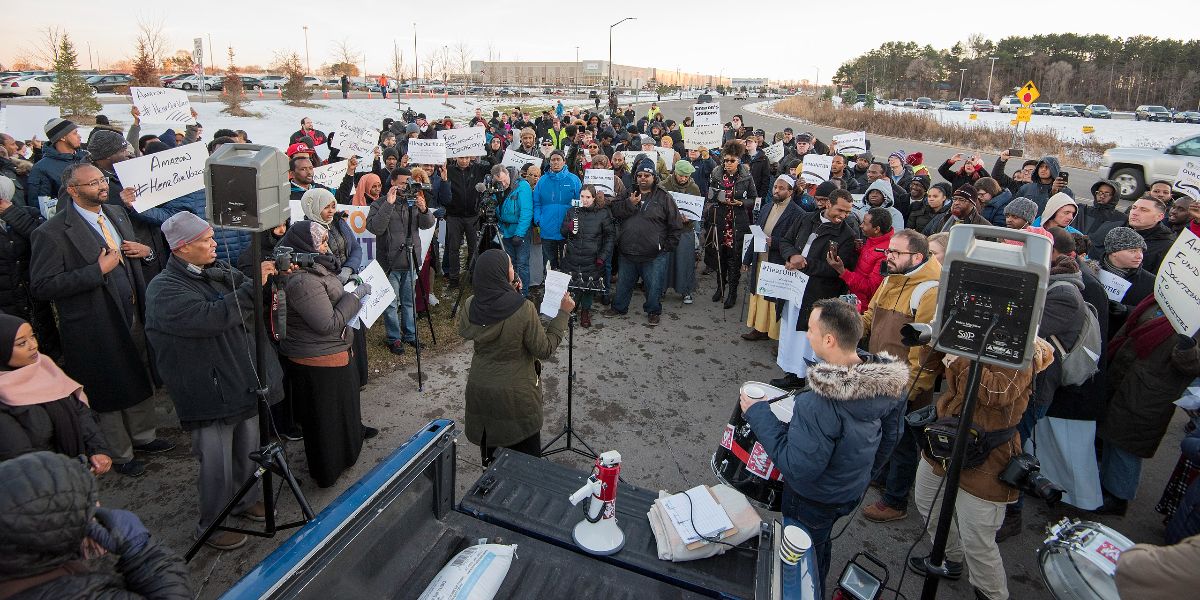
Nov. 15/ Latvia to allow businesses to fire the unvaccinated:The Latvian government will allow businesses to dismiss their employees without pay or transfer them to remote work starting Monday if they refuse to get vaccinated against coronavirus.
- What’s happened so far: Latvia is one of the least vaccinated European Union countries, with a vaccination rate of 64 percent, compared with the European average of 75 percent. The country has recently seen a jump in coronavirus cases, forcing the government to enforce a four-week lockdown on Oct. 21. In late October, Latvian President Egils Levits tested positive for the virus as the country was recording the second-worst infection numbers in the EU.
- The impact: Prime Minister Krišjānis Kariņš apologized to those vaccinated for having to “carry the burden” of a new round of restrictions. The new law will come into effect as the lockdown is lifted, but there will be some exceptions for those who cannot vaccinate for medical reasons or those recently infected. At first, businesses will suspend those unvaccinated without pay and will then be allowed to fire them if they do not get the vaccine within three months. The move has received criticism and there are several court cases ongoing, including from an official from the Ministry of Welfare and her husband who argued the law is “not safe and discriminatory.”
Nov. 15/ Alex Saab arraignment: Alex Saab, a Colombian businessman and prominent ally of Venezuelan President Nicolás Maduro, is scheduled Monday to be arraigned in Miami on a financial conspiracy charge that his supporters argue is politically motivated.
- What’s happened so far: Saab was arrested last year in the West African island country of Cape Verde, then extradited to the United States last month to face criminal charges. Prosecutors dropped seven money laundering charges initially filed against Saab, maintaining a conspiracy to commit money laundering charge that carries a maximum penalty of 20 years. That’s the incarceration limit under Cape Verde’s laws, which U.S. officials reportedly promised to abide by when they made the extradition deal.
- The impact: The United States alleges Saab stole about $350 million from Venezuela in an operation that involved bribing local officials, falsifying documents and using bank accounts in the United States. Maduro has moved on multiple fronts to pressure for Saab’s release, including granting him Venezuelan citizenship and diplomatic status, imprisoning six American oil executives on corruption charges and suspending talks with the U.S.-backed political opposition in his country. Saab’s lawyer said he would plead not guilty prior to the arraignment’s original date of Nov. 1, which was postponed.
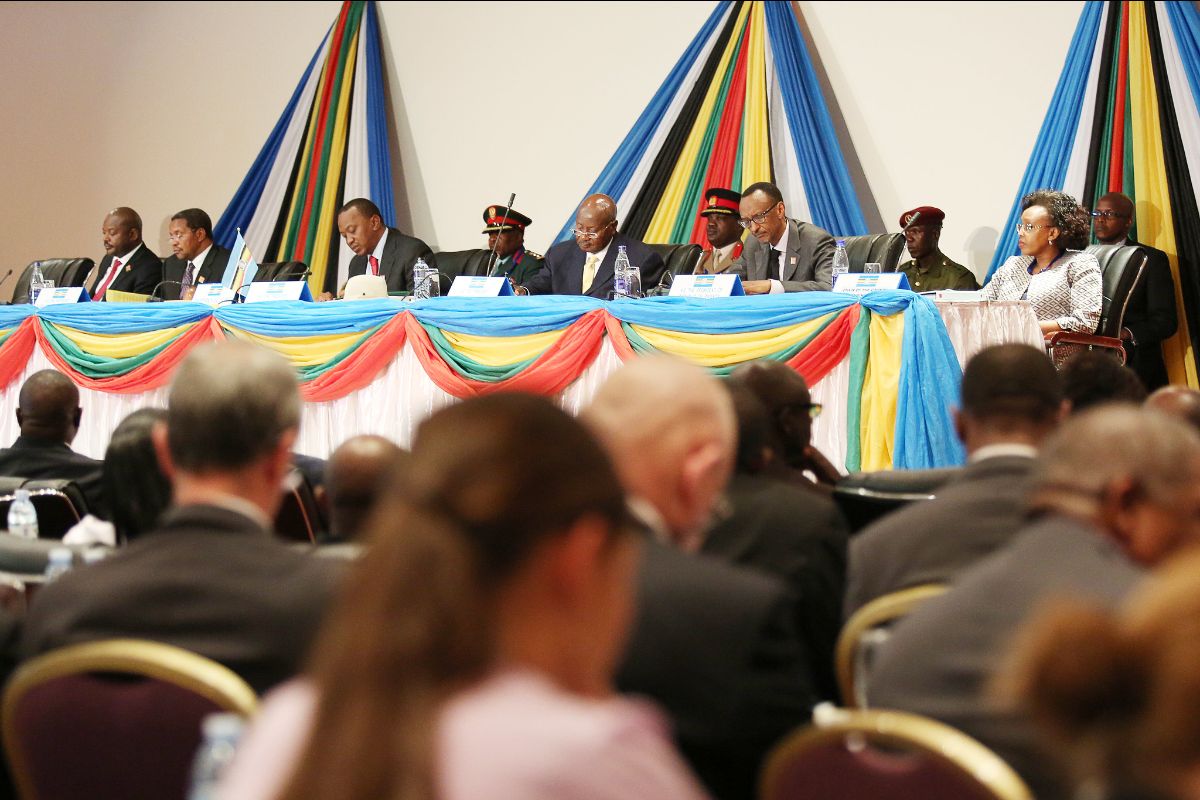
Nov. 16/ East African bloc meeting on Ethiopia: Uganda’s President Yoweri Museveni has called a meeting of the Intergovernmental Authority on Development (IGAD) on Tuesday to discuss the escalating crisis in Ethiopia.
- What’s happened so far: The IGAD, a trade bloc of which Ethiopia is a founding member, has already joined other regional organizations in calling for an immediate ceasefire. Kenya’s President Uhuru Kenyatta said he had leveraged his position as Chairman of the East African Community and Africa’s representative to the U.N. Security Council to advocate for a peaceful resolution to the conflict between the Ethiopian government and the Tigray People’s Liberation Front (TPLF). African Union envoy Olesegun Obasanjo said this week he had identified a small “window of opportunity” for a dialogue between the warring parties, but no date for talks has been announced.
- The impact: While regional organizations continue to appeal for calm, the situation on the ground is deteriorating further. Mass detentions of Tigrayans continue, as the Ethiopian government reportedly suspects them of supporting the TPLF. The U.N. warned an estimated 400,000 people in Tigray are living in famine-like conditions, as no humanitarian supplies have entered the region since Oct. 18. Neighboring nations are said to be concerned about the flow of weapons into the country and a possible influx of hundreds of thousands refugees if the conflict goes on.
Nov. 17/ U.S. auction for Gulf of Mexico drilling: In compliance with a court order to resume oil and gas lease sales, the U.S. Interior Department will hold a live-streamed auction Wednesday of approximately 80 million acres offshore — the first such auction under President Joe Biden’s administration.
- What’s happened so far: The last sale in the Gulf of Mexico was in November 2020. Upon taking office in January 2021, Biden, who campaigned on a promise to end new federal oil and gas leasing as part of a climate change agenda, paused drilling auctions pending an environmental analysis. In June, a federal judge in Louisiana ordered the administration to resume the auctions, saying that the government was required by law to offer acreage to the oil and gas industry.
- The impact: The lease sale will include more than 15,000 blocks located up to 231 miles offshore in the Gulf of Mexico. While the Bureau of Ocean Energy Management said it will include lease stipulations to account for biological and environmental impacts, a lawsuit filed in August challenged the administration’s decision to hold the lease sale, saying it used an outdated 2017 environmental analysis and didn’t meet a legal requirement to carefully study the impacts of the auction.
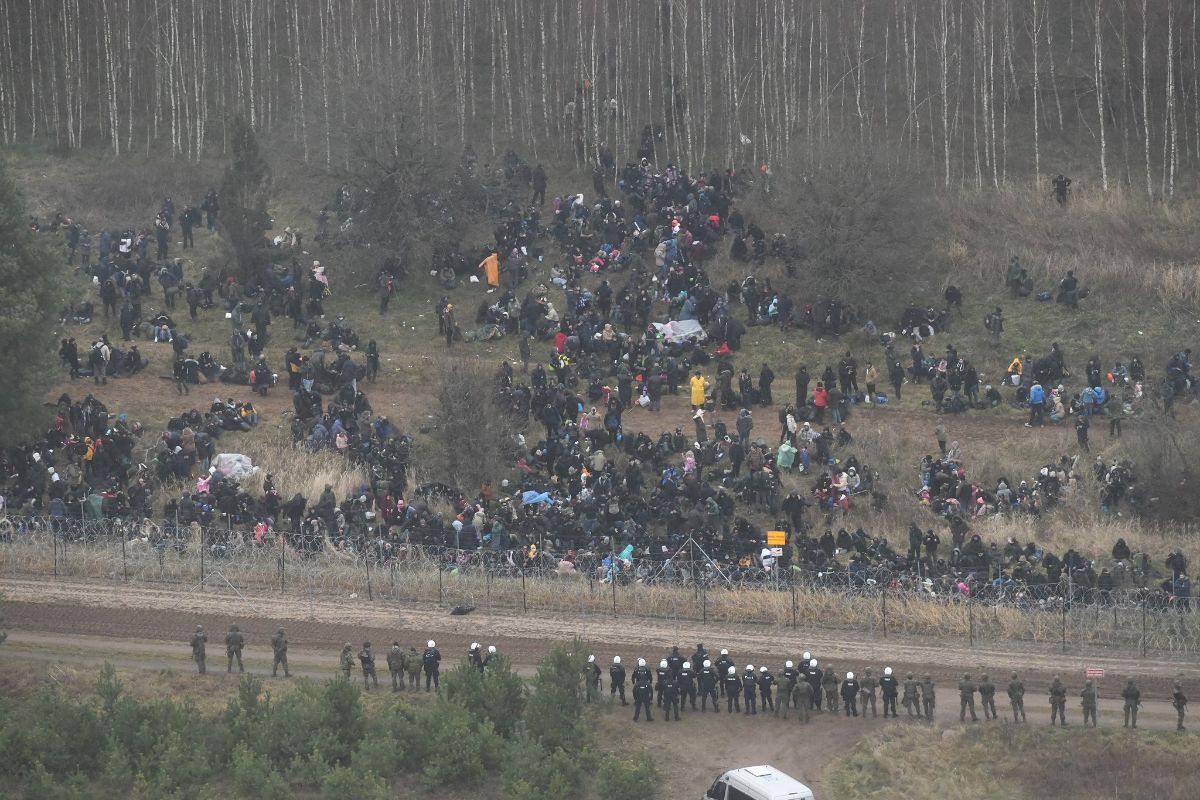
What else matters:
Belarus border crisis: The migrant crisis on the European Union’s external border with Belarus escalated significantly over the past week, with Poland sealing its border and Lithuania declaring a state of emergency along its Belarusian frontier. The escalations came after thousands of additional migrants set up camps in Belarus along the Polish border, exacerbating what Polish authorities described as “hybrid” warfare from Minsk to retaliate against the EU for sanctions following last August’s disputed presidential election.
- Watch for: The escalating crisis has prompted fears of a potential armed confrontation between NATO member Poland and Russia-aligned Belarus, with tens of thousands of soldiers on high-alert on both sides of the border. Lithuania also deployed additional units to its border. There were unconfirmed reports of gunfire at the Polish border last week, and with so many soldiers in close proximity it is easy to envision a potential escalatory scenario. The inhospitable conditions migrants face also present a stark humanitarian crisis, with at least seven deaths confirmed in Poland and several more reported in Belarus. With winter conditions worsening and both sides’ positions hardening, the situation could continue to spiral.
Taiwan-China conflict: A delegation of U.S. lawmakers arrived in Taiwan this week via military plane in a move sure to aggravate strained cross-strait and U.S.-China relations. The U.S. Department of Defense confirmed the trip, the second such visit conducted by congressional members this year, but did not offer details on who exactly was involved. The trip comes amid growing Chinese military activity in the region, sour U.S.-China relations and a push by U.S. lawmakers for pro-Taiwan, anti-China legislation. China denounced the visit as interference in its internal affairs as Beijing sees Taiwan as part of its own territory, though the island is a self-governing democracy.
- Watch for: Increased military activity around Taiwan is likely to continue. China conducted a “combat readiness patrol” in the direction of the Taiwan Strait after condemning the U.S. lawmakers’ visit and has sent warplanes through Taiwan’s Air Defense Identification Zone with increasing frequency over the past year with no signs of easing. Both the United States and China have spoken out against fueling tensions over Taiwan, but policy is unlikely to change substantially on either side despite growing friction.
Extended outlook: What’s on our radar in the coming weeks
Nov. 12: Turkic Council leaders meet; Paris conference on Libya; Chilean Senate vote on removal of President Piñera
Nov. 14: Bulgaria presidential election; Argentine legislative elections
Nov. 15: Alex Saab arraignment; Cuba reopens borders to tourism; labor board to hear Amazon workers’ bid for NY union vote; Latvia will allow businesses to fire the unvaccinated
Nov. 16: East African bloc leaders meeting on Ethiopia; Former Netanyahu top aide to testify against the former PM in Jerusalem
Nov. 17: Gulf of Mexico oil and gas auction
Nov. 20: 89th General Assembly of Interpol in Istanbul
Nov. 21: Chilean general election to elect a new president and National Congress
Nov. 22: Deadline for U.S. federal employees to be fully vaccinated
Nov. 23: South Australia will ease border restrictions for double-vaccinated people
Nov. 25: U.S. Thanksgiving
Nov. 28: Honduran general election; Hanukkah begins
Nov. 29: Opening statements in Ghislaine Maxwell trial
Nov. 30: Volcanic eruption simulation in Cape Verde
Dec. 1: SCOTUS hears arguments in challenge to Mississippi abortion law; 2021 FIFA Arab Cup
Dec. 4: Gambian presidential election; French political party Les Republicans will nominate candidate for 2022 presidential election
Dec. 18: Taiwan referendum
Dec. 19: Hong Kong legislative election
Dec. 20: Syria talks in Nur-Sultan, Kazakhstan

